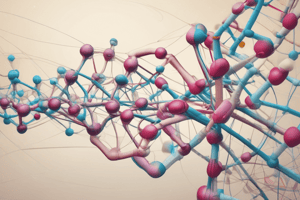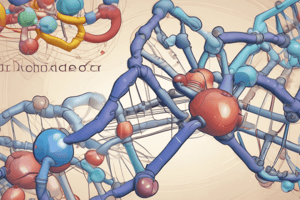Podcast
Questions and Answers
Why is ELISA widely employed in hormone assays?
Why is ELISA widely employed in hormone assays?
ELISA offers high sensitivity, low cost per test, and ease of automation.
What are some methods used by clinicians to determine levels of specific hormones?
What are some methods used by clinicians to determine levels of specific hormones?
Immunoassay methods such as radioimmunoassay, ELISA, chemiluminescent immunoassay, and TRFI.
How do enzymes function in cellular processes?
How do enzymes function in cellular processes?
Enzymes act as biological catalysts that speed up reactions without being consumed themselves.
What insights can be gained by analyzing enzymatic reactions under varying substrate concentrations?
What insights can be gained by analyzing enzymatic reactions under varying substrate concentrations?
Give examples of metabolic disorders caused by genetically determined errors.
Give examples of metabolic disorders caused by genetically determined errors.
Study Notes
Clinical Biochemistry: Understanding Proteins, Hormones, Enzymes, Metabolism, and Diagnostic Tests
Clinical biochemistry is a specialized branch of science that applies chemistry principles to analyze body fluids such as blood, urine, cerebrospinal fluid, amniotic fluid, and sputum. This field utilizes various techniques to measure and interpret compounds like proteins, hormones, enzymes, and other molecules essential to our bodies' normal functioning. Four key areas within clinical biochemistry will be discussed below: protein electrophoresis, hormone assays, enzyme kinetics, and the diagnostic role played by understanding metabolic disorders and performing biochemical tests.
Protein Electrophoresis
Protein electrophoresis separates proteins based on charge-to-mass ratios, allowing us to identify abnormalities in their size, shape, or location within cells, tissues, or circulation systems. There are several types, including agarose gel electrophoresis, polyacrylamide gel electrophoresis (PAGE), capillary electrophoresis, isoelectric focusing, and two-dimensional electrophoresis. Each has its advantages and applications—for example, PAGE can distinguish between monomeric, dimeric, trimeric, and higher molecular weight proteins while also providing better resolution.
Hormone Assays
Hormones regulate multiple organ functions and are responsible for maintaining homeostasis in the human body. To determine levels of specific hormones, clinicians utilize immunoassay methods such as radioimmunoassay, enzyme-linked immunosorbent assay (ELISA), chemiluminescent immunoassay, and time-resolved fluoroimmunoassay (TRFI) to accurately quantify these chemical messengers in biological samples. For instance, ELISA is widely employed because it offers high sensitivity, low cost per test, and ease of automation.
Enzyme Kinetics
Enzymes facilitate almost every cellular process, acting as biological catalysts that speed up reactions without being consumed themselves. Analyzing how enzymatic reactions respond to varying concentrations of substrate(s) provides insights into disease states, genetic factors affecting proteins, and medication effects. Commonly used methods to study enzyme kinetics involve Michaelis-Menten analysis, Lineweaver-Burk plots, and Eadie-Hofstee diagrams. These approaches help reveal changes in enzyme activity and detect alterations in substrate affinity, catalytic efficiency, or total enzyme concentration.
Metabolic Disorders
Metabolic disorders result from genetically determined errors in the intermediary metabolism pathways, leading to defective breakdown or synthesis of nutrients, toxins, and waste products. Some examples include phenylketonuria (PKU) due to a deficiency in phenylalanine hydroxylase, galactosaemia caused by deficientgalactose-1-phosphate uridylyltransferase, and glycogen storage diseases resulting from mutations in genes encoding glycogen synthase, phosphorylase kinase, or phosphatases involved in glucose regulation. Accurately diagnosing metabolic disorders often requires assessing relevant biomarkers through analytical procedures carried out in clinical laboratories.
Biochemical Testing
To investigate potential alterations in proteins, hormones, enzymes, and metabolic processes, clinical biochemists perform various laboratory tests using blood or urine specimens. Blood tests commonly utilized include:
- Glucose estimation to monitor diabetes and hypoglycemia/hyperglycemia events
- Liver function tests to evaluate liver health before surgery or during drug treatments
- Kidney function tests to screen renal dysfunction indicators
Furthermore, specific biochemical tests aid in identifying conditions associated with particular organs and systems, such as thyroid testing for hypothyroidism or hyperthyroidism, lipid profile evaluation to examine cholesterol levels connected to cardiovascular disease risk, and amino acid measurements for neurodevelopment issues linked to inherited metabolic disorders.
In summary, clinical biochemistry plays a pivotal role in uncovering crucial information about proteins, hormones, enzymes, and metabolic processes in the context of personalized patient care. By employing innovative technologies and following current guidelines, trained professionals strive to enhance diagnosis accuracy, support treatment decisions, and improve overall patient outcomes.
Studying That Suits You
Use AI to generate personalized quizzes and flashcards to suit your learning preferences.
Description
Test your knowledge on proteins, hormones, enzymes, metabolism, and diagnostic tests in clinical biochemistry. Explore topics like protein electrophoresis, hormone assays, enzyme kinetics, metabolic disorders, and biochemical testing.




